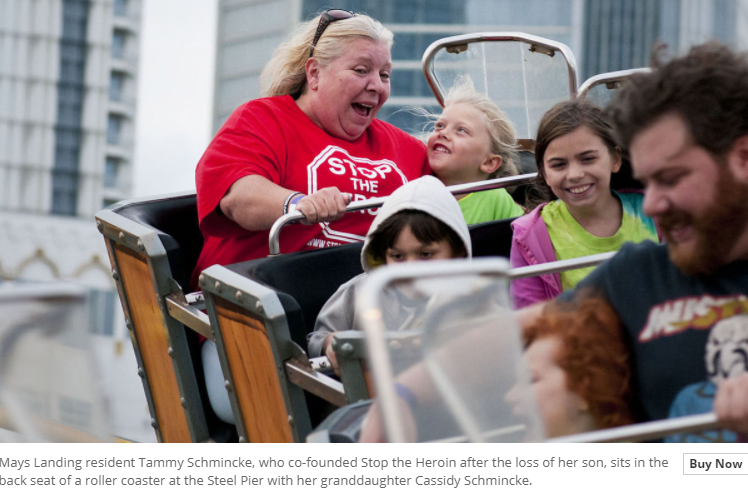pressofatlanticcity.com: Kids, families find comfort in each other after loved ones overdose
9/7/2017
ATLANTIC CITY — Kids wearing purple admission wristbands ran across the boards on Steel Pier, jumping from the Crazy Mouse to the Flying Dutchman to the Beach Buggies.
Their exuberance matched the smiles on the faces of the parents, grandparents, aunts and uncles watching them play.
The special event, held on a recent Monday, was organized by the Stop the Heroin organization for children who had lost a parent or guardian to a drug-related death. The kids hadn’t had such a carefree time in so long, some parents said, as they joined the growing number of children who feel the pain of the opioid epidemic.
“These kids are left behind, because, when it’s all done, we, the families, are still here,” said Tammy Schmincke, co-founder of Stop the Heroin.”
Addiction took the lives of 1,587 state residents in 2015, according to the state Medical Examiner’s Office, and a majority used an opioid such as heroin or fentanyl. Officials say those numbers are climbing higher every year, and victims continue to leave behind family and friends, including young children.
Kristin Keubler, of Hammonton, became the sole provider for her two sons after her fiance, Raymond Hampton, died of an overdose in July 2016 after being in long-term recovery.
She said her sons, ages 5 and 13, have had to adjust to life without their dad, and the Stop the Heroin event gave them a couple hours to just have fun and worry about being kids, not what they had been through.
“The support you get from people after you lose someone, it slowly fades away. The phone calls, the visits — life goes on,” she said. “But the heartache these kids have, it doesn’t go away. They live with it every single day.”
Schmincke and her husband, Bill, said losing their son Steven to a heroin overdose in March 2016 caused indescribable pain, but what was truly heartbreaking, Schmincke said, was telling her two granddaughters that their father was gone.
“I will always remember that day. We brought them to the beach, stayed there for a while and told them that daddy wasn’t coming home,” Schmincke said, pausing. “And the oldest one, she just kept saying, ‘Not my daddy.’ I will never forget the look on their faces that day.”
The girls, Cassidy, 7, and Abigail, 6, live with the Schminckes as their mother works at treatment and recovery efforts for her own addiction. They were joined on the Boardwalk by their other two grandparents, who are raising the girls’ baby brother Steven, named after the father he will never meet.
Bill Schmincke said the children understand heroin is something bad, but they don’t know the full significance. A conversation about their father’s addiction and his overdose is not too far off, the grandfather said, but the family is prepared.
Keubler said she is very open about addiction and overdose with her oldest son, who lived with Hampton since he was 3 years old and saw him as his father figure.
Because there is a stigma still attached to addiction, Keubler said, it was good for her teenager to see other kids at the event and know he was not alone in losing a parent that way.
“You could tell he felt some kind of comfort knowing other kids could relate to what they went through,” she said. “He’s had two friends in his class that have lost fathers this year. Hopefully he will be able to support them in some way when they go back to school in September.”
The families were treated to pizza at Gino’s Pizza in Atlantic City, where owners donated food for the event. Steel Pier donated the all-access ride passes for the children as well.
Victoria Champion, of Hammonton, brought her three grandchildren, who this past year lost both their mother and father to drug overdoses.
She said despite the differing thoughts people may have about addiction, events like this were needed to support innocent children who felt the loss of a parent just like any other, “because it’s all about the kids.”
The families stayed on the Boardwalk for several hours to hit all the rides, sometimes more than once. Without the donated passes, it could have been an expensive night for anyone, but especially for families who have lost a caregiver and income, Schmincke said.
She would like to see more businesses and organizations donate to communities and create programs that help support children who have lost parents or caregivers to addiction, similar to support programs that exist for other families who have lost loved ones in accidents, job-related events or from disease.
“The kids are heroin’s victims who are left behind,” Schmincke said. “It’s just not fair for these kids.”
